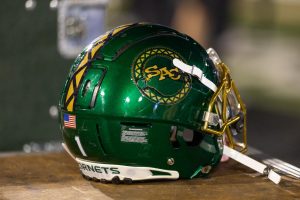Daily Show educates students with laughs
February 16, 2005
The fact of the matter is that most college students don’t care about politics, but Jon Stewart and “The Daily Show” on Comedy Central are trying to change that through the use of quick-witted comedy.
However, what kind of influence does the show really have on college-aged voters?
The show that has been gaining more popularity as of late has a huge potential to influence political views of the masses. Stewart, who took over hosting the show in 1999, seems to have a knack for finding the issues that really deserve to be laughed at.
He tears these apart on national television; who wouldn’t love that?
Matt Roberts, a government major who will be graduating this semester, is a fan of Stewart’s political satire. He feels that since the material is introduced in such a humorous way, it is much easier for college students not only to understand things happening in politics, but also to care about politics in general.
“The show’s dang funny,” Roberts said. “It finds ridiculous things in political life and makes fun of it.”
Since college-aged people have the worst numbers for voter turnout, Roberts feels that when you can find an effective medium to relay political messages to that group, it becomes an effective way of getting them involved and tapping this otherwise-unused resource for votes.
Republicans and democrats alike can enjoy the show; Roberts pointed out that it efficiently makes fun of both sides, ensuring not to leave anyone out who has earned a good place in fake news.
“The show is nonpartisan in nature,” Roberts said. “It makes fun of whoever deserves it.”
Kylie Webb, a sophomore communications major, also watches “The Daily Show” occasionally and likes to watch its investigative journalism segments, which consist of news correspondents interviewing people while aiming to make them look ridiculous.
She agrees that the show is a powerful tool in the political world, but thinks there is more of a political bias on the show.
“The approach to politics is what draws in college students,” Webb said.”But I feel it’s quite liberal; but what isn’t on television?”
Some people argue, like Webb, that the show oftentimes displays a more liberal side, making fun of republicans more than democrats. Stewart has confessed that he doesn’t care who is in office, because whoever is will continue to provide all the material he needs to make fun of them.
During the segment “Indecision 2004,” where the show critiqued John Kerry and George W. Bush, both candidates were under fire constantly.
Stewart tends to use his position not only to make fun of political life, but also to bring to the attention of all viewers the responsibility and problems that America faces in politics. On Oct. 15, 2004, Stewart appeared on CNN’s “Crossfire” and stood up for true democracy, accusing the show of hurting America by being too complacent and soft on its political guests. Stewart said “Crossfire” hurts America when it questions the actions of political leaders with “partisan hackery.”
Another interesting aspect of the “The Daily Show” is that it continues to host appearances of prominent political figures from both parties and outside influences. Stewart discusses current issues and ideology with his guests in a casual format.
Some of his more popular guests have been John Kerry, Paul O’Neil, Anderson Cooper, Tom Brokaw, Joe Lieberman and Jim Wallis. Some of the interviews were humorous, but the majority were really trying to get to the heart of political issues.
Ultimately, I believe the show is a great way of getting college students involved in the political world.
The show does not tell you whom to vote for or even attempt to influence your vote; it just helps to make voters more aware of the issues at stake and the responsibility we all have.
The half-hour show runs Monday through Thursday at 11 p.m.; and for those of you who can’t stay up that late, the previous day’s show can be seen at 7 p.m. on Comedy Central.
Contact Andrew at [email protected]




























































































































